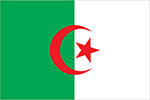
Population
44M+
CHRISTIAN PERSECUTION STATUS
high
Persecution
CHRISTIAN POPULATION
<1%
Status of
the church
In modern-day Algeria, more than 99% of the population is Muslim. And under 1% is Christian or Jewish. Islam is the state religion, and although the constitution provides for freedom of belief. However, it is illegal to proselytize to Muslims, and converts may face pressure and harassment from their communities.
Despite these issues, the Church in Algeria has been growing in recent decades. Some churches have seen an incredible increase in numbers, particularly among those from a Kabyle Berber background.
In addition to poverty and unemployment, endemic government corruption and poor standards in public services are also chronic sources of dissatisfaction. According to CIA World Factbook, about 20% of Algeria’s population is illiterate. This percentage rises to almost 27% for women in the region. However, satellite television is popular, and Internet usage has increased (4.7 million internet users by 2010, Internet World Stats).
Location
Prayer points